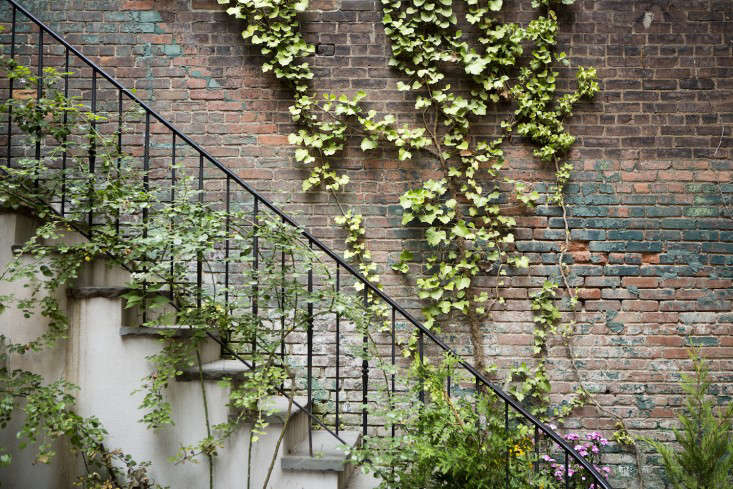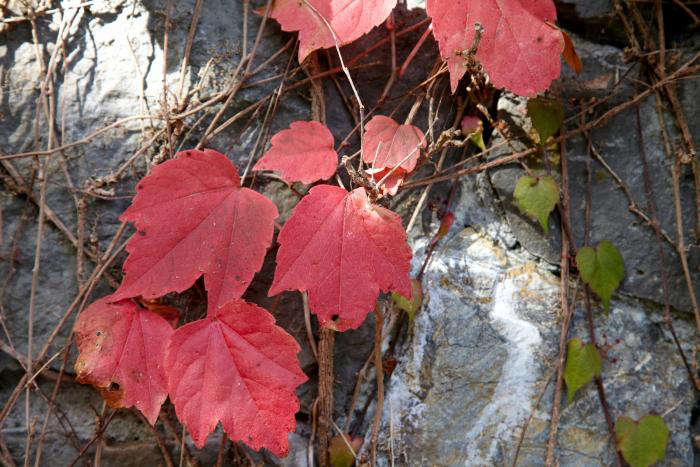Ivy, Hedera: “The Frenemy”
Not all friendships are perfect. We like friends to be close, but not necessarily to stick to us like glue. It’s hard to tell whether ivy is on good terms with the buildings that its vines scale and cling to. On the one hand, an ivy-covered brick reminds us of favorite classic novels and The Dead Poets Society, but on the other, we worry that the climber is smothering those very beloved structures.
There are more than a dozen species of ivy and in their native environments—they hail from Asia, Europe, or Africa—they behave well. But transplants can be invasive pests in North America and Australia where there are fewer ecological checks to keep them in balance. Ivy’s enthusiastic aerial roots can penetrate the cracks in mortar and gradually pry apart stones and bricks. If you choose to bring ivy into your circle, you should know and accept its character flaws.
Above: Photograph by Douglas Lyle Thompson for Gardenista.
Charles Dickens once wrote a poem about ivy’s overly friendly qualities. “Oh dainty plant is the ivy green that creepeth over ruins old! How closely he twineth, how tight he clings, to his friend the huge Oak Tree!” (There’s a reason Dickens is better known for his novels).
Never, never, let ivy climb your trees as he describes in the poem. Cut it back with clippers—or for thicker ivy, you may need a saw—and spray the cut ends with an environmentally sensitive anti-ivy herbicide.
Above: Hedera helix (common ivy) is a vigorous climber. Photograph by Staszek99 via Wikimedia.
Cheat Sheet
- Leaf color may vary: English ivy has white veins and Boston ivy turns a beautiful red color in autumn.
- Evergreen ivy will provide a green backdrop even beneath snow.
- Be sure to prevent your ivy from climbing trees. The moment it starts climbing up the trunk, cut it back.
Above: Boston ivy on a wall. Photograph by Marla Aufmuth for Gardenista. For more, see A Survivor: A Grand Seaside Garden in Tiburon.
Keep It Alive
- Ivy will thrive in ares with partial shade or full sun.
- Ivy can fill any size hole, sometimes too quickly!
- Plant ivy in fall or spring.
Above: Photograph by Pancho Tolchinsky for Gardenista.
Let’s not forget that ivy, when properly supervised, can make a lovely companion if you’re willing to get literally attached. Ivy makes for beautiful borders and is reliable as ground cover for unsightly patches in the garden. . With few sun and water needs, ivy is easy to be around, but if you ignore it, friend may turn to foe.
For more vines and climbers, see our Gardening 101 posts on Wisteria and Wild Grape Vine.
Finally, get more ideas on how to successfully plant, grow, and care for ivy with our Ivy: A Field Guide.
Additionally, get more ideas on how to plant, grow, and care for various ground cover plants with our Ground Covers: A Field Guide.
Finally, get more ideas on how to plant, grow, and care for various vines and climbers with our Vines & Climbers: A Field Guide.
















Have a Question or Comment About This Post?
Join the conversation (2)